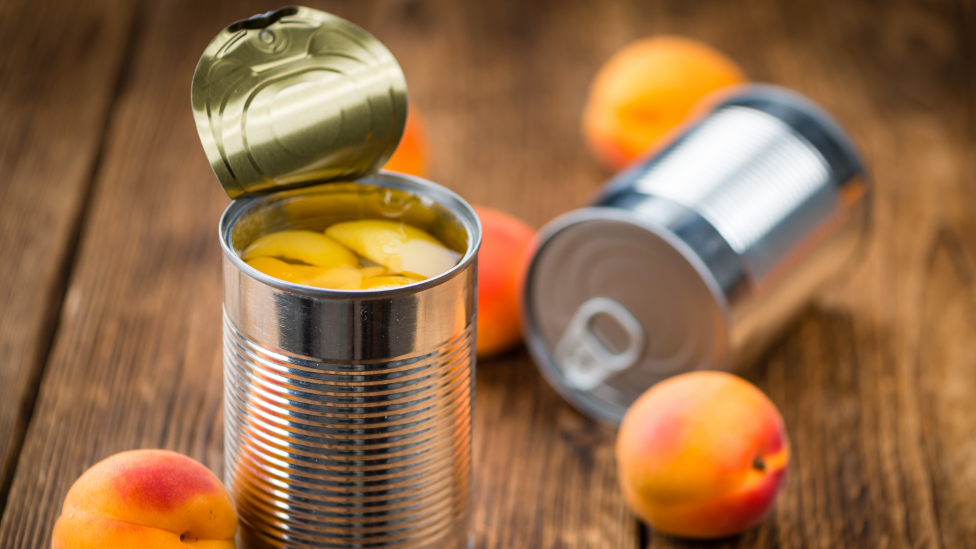Foods for families on low incomes will include tinned fruit
- Published

Tinned fruit is to be added to a healthy eating scheme to help low income families
Tinned fruit is to be added to a list of healthy foods which families on low incomes can buy using Scottish government-issued vouchers.
A revamp of the Healthy Start Voucher scheme will raise weekly payments from £3.10 to £4.25 and increase the range of foods on offer.
Health experts have voiced concerns about the sugar in some tinned fruit.
The Scottish government said it would advise families to choose healthiest products that do not use syrup.
Nutritionist and author Dr Zoe Harcombe said that while many tinned products are healthy, there are others that are much less so.
She said: "It is possible to get sugar-free tinned fruit but you would have to ask how readily available that is, especially in poorer areas, and the concern would be that if the vouchers are being used for tinned fruit in heavy sugary syrup.
"It is great that the scheme is being expanded and there are some good healthy choices here, but I think there needs to be an element of refinement.
"Even working within the potential limitations of what might be available locally to people I would much rather see something like tinned oily fish on the list than tinned fruit."
Best Start Foods
The current UK-wide Healthy Start Scheme provides vouchers to purchase healthy foods for all pregnant teenagers under the age of 18, as well as pregnant women and families with children under the age of four who qualify for certain welfare payments.
The scheme is to be devolved to Scotland and will be rebranded as Best Start Foods.
As well as increasing the payments, the Scottish government will change the scheme so the vouchers will be in the form of smartcards which can be spent at shops.
The vouchers can currently be used to buy cow's milk, infant formula milk, and fresh or frozen fruit and vegetables
The scheme will now be expanded to include tinned fruit and vegetables, dried or tinned pulses and eggs.

Tinned fruit and vegetables can count towards the recommended "five a day"
Sarah Coe, nutrition scientist at the British Nutrition Foundation charity, said: "Canned fruit counts towards the recommended minimum of five portions of fruit and vegetables a day, and as it keeps for much longer than fresh fruit can be an easy and convenient way of getting fruit into the diet.
"But to reduce intake of free sugars, people should avoid fruit canned in syrup and choose fruit in natural juice with no added sugar, making sure to drain and rinse the fruit before eating."
The British Dental Association's scientific adviser, Damien Walmsley said: "Tinned fruit and vegetables can be beneficial in the diet because the process of preserving them happens soon after picking (like frozen), so the nutrients are preserved whereas keeping fresh fruit and veg for ages means they lose their nutrients over time.
"However, avoid fruit that's tinned in syrup (this raises the sugar content) and vegetables tinned in salt water."
Guidance plan
The Scottish government said it would offer guidance recommending the purchasing of fresh fruit and vegetables where possible, and tinned fruit or vegetables in water, rather than salted water or syrup, where not.
A spokesperson added: "Tinned fruit and vegetables have a long shelf life, are a good source of vitamins, minerals and dietary fibre, and including them as an option where fresh produce is not available provides extra choice for families using the scheme.
"Tinned fruit or vegetables can be particularly helpful for those who have limited freezer space or limited access to fresh fruit and vegetables in their area, including remote rural communities."